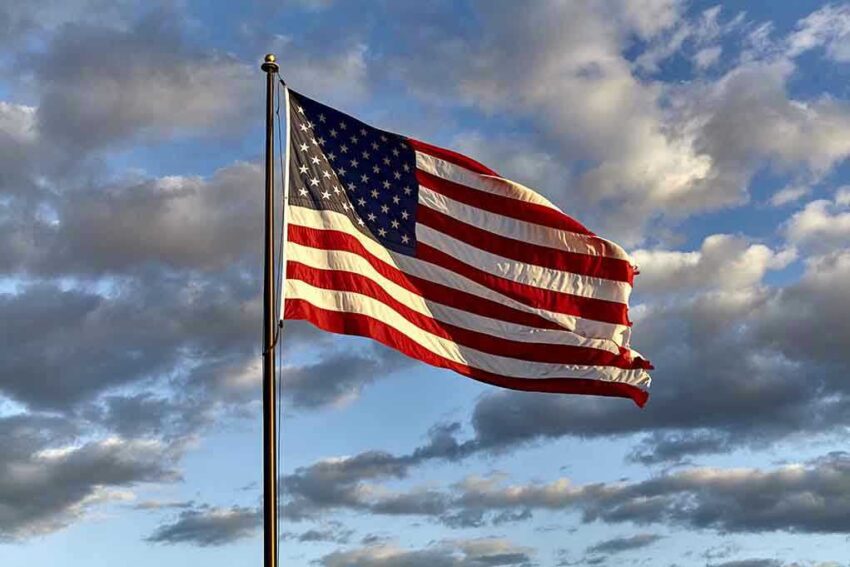A direct challenge to the First Amendment is underway as President Trump orders aggressive prosecution for flag desecration, igniting fierce debate over constitutional freedoms and patriotic values.
Story Overview
- President Trump signed an executive order targeting flag desecration after a veteran burned the American flag outside the White House.
- The order seeks maximum prosecution for flag burning, directly confronting Supreme Court precedent protecting this act as free speech.
- Immigration consequences are introduced for foreign nationals involved in flag desecration, expanding the order’s reach.
- Legal challenges from civil liberties groups are expected, with the issue likely heading to the Supreme Court.
- The move has intensified national debate over the balance between patriotic symbolism and constitutional rights.
Trump’s Executive Order: Immediate Response to Flag Burning Incident
On August 26, 2025, President Trump signed an executive order instructing the Attorney General to prosecute anyone who desecrates the American flag, including through burning, to the fullest extent allowed by law. This action directly followed a highly publicized incident where a military veteran burned the flag outside the White House, propelling the issue into the national spotlight and prompting swift White House action. The administration’s move was presented as a necessary step to restore respect for American symbols and respond to public outrage over the event.
The executive order not only targets citizens but also introduces immigration consequences for foreign nationals who desecrate the flag. This includes possible deportation, reflecting a broader approach to upholding the sanctity of national symbols. The White House fact sheet argues that flag desecration is “uniquely and inherently offensive and provocative,” and the executive branch has made clear its intent to enforce consequences beyond traditional boundaries, including targeting non-citizens. These provisions are designed to deter both Americans and foreign nationals from engaging in acts seen as deeply disrespectful to the nation.
Legal and Constitutional Tensions: Clash with Supreme Court Precedent
This executive order marks a direct and unprecedented challenge to established Supreme Court decisions, specifically the landmark cases of Texas v. Johnson (1989) and United States v. Eichman (1990). Both cases held that flag burning constitutes protected speech under the First Amendment. By directing the Justice Department to pursue maximum penalties for flag desecration, the Trump administration is testing the limits of executive authority and constitutional interpretation. Legal experts and civil liberties organizations, such as the ACLU, have already announced plans to challenge the order, warning that it threatens to erode core First Amendment protections and set a dangerous precedent for future limits on free expression.
The debate now centers on whether executive power can override or circumvent the Supreme Court’s clear rulings that symbolic acts like flag burning are a form of protected speech. The White House maintains that exceptions exist for acts inciting violence, but legal analysts point out that most flag burning incidents do not meet the narrow definitions required for such exceptions. This looming legal battle will likely reach the Supreme Court, where the boundaries of free speech and executive authority will be tested once again.
Broader Impact: Political, Social, and Immigration Ramifications
In the short term, the executive order is expected to result in increased prosecutions for flag desecration and a surge in First Amendment litigation. The immediate response from civil liberties groups and activists suggests a protracted legal fight. For the conservative base, the order is seen as a long-overdue assertion of national pride and a rebuke to those who would disrespect American values. For others, it raises concerns about government overreach and the suppression of dissent.
Veteran burns American flag in front of White House on day of controversial Trump executive order https://t.co/aJd9ts2aiL
— Fox News Politics (@foxnewspolitics) August 28, 2025
The order’s inclusion of immigration consequences for non-citizens marks a significant expansion of its reach, with potential long-term impacts on immigrant communities. These measures tie respect for national symbols directly to immigration status, amplifying the administration’s broader agenda of strict immigration enforcement and linking patriotism to legal presence in the country. Socially and politically, this move has heightened polarization, mobilizing both conservative groups defending patriotic values and civil liberties advocates warning of constitutional erosion. The legal and cultural reverberations are likely to persist well beyond this administration, as the nation confronts ongoing questions about the balance between free expression and respect for its most cherished symbols.
Expert and Public Reactions: A Nation Divided Over Symbols and Rights
Constitutional scholars largely agree that the executive order faces steep legal hurdles, given decades of Supreme Court precedent. Civil liberties advocates warn that undermining First Amendment protections in the name of patriotism threatens the core of American democracy. Conversely, conservative commentators and many veterans argue that the flag deserves special protection, and acts of desecration are an affront to the nation’s unity and history. The protest by a veteran has added emotional weight, highlighting the deep divisions over what it means to honor or protest the nation. As the legal fight unfolds, both sides see the stakes as central to America’s identity—whether defined by unwavering respect for its symbols or by the strength of its constitutional freedoms.
Sources:
Fact Sheet: President Donald J. Trump Protects the American Flag from Desecration
Executive Order: Prosecuting the Burning of the American Flag
Click this link for the original source of this article.
Author: editor
This content is courtesy of, and owned and copyrighted by, https://republicannews.org and its author. This content is made available by use of the public RSS feed offered by the host site and is used for educational purposes only. If you are the author or represent the host site and would like this content removed now and in the future, please contact USSANews.com using the email address in the Contact page found in the website menu.





